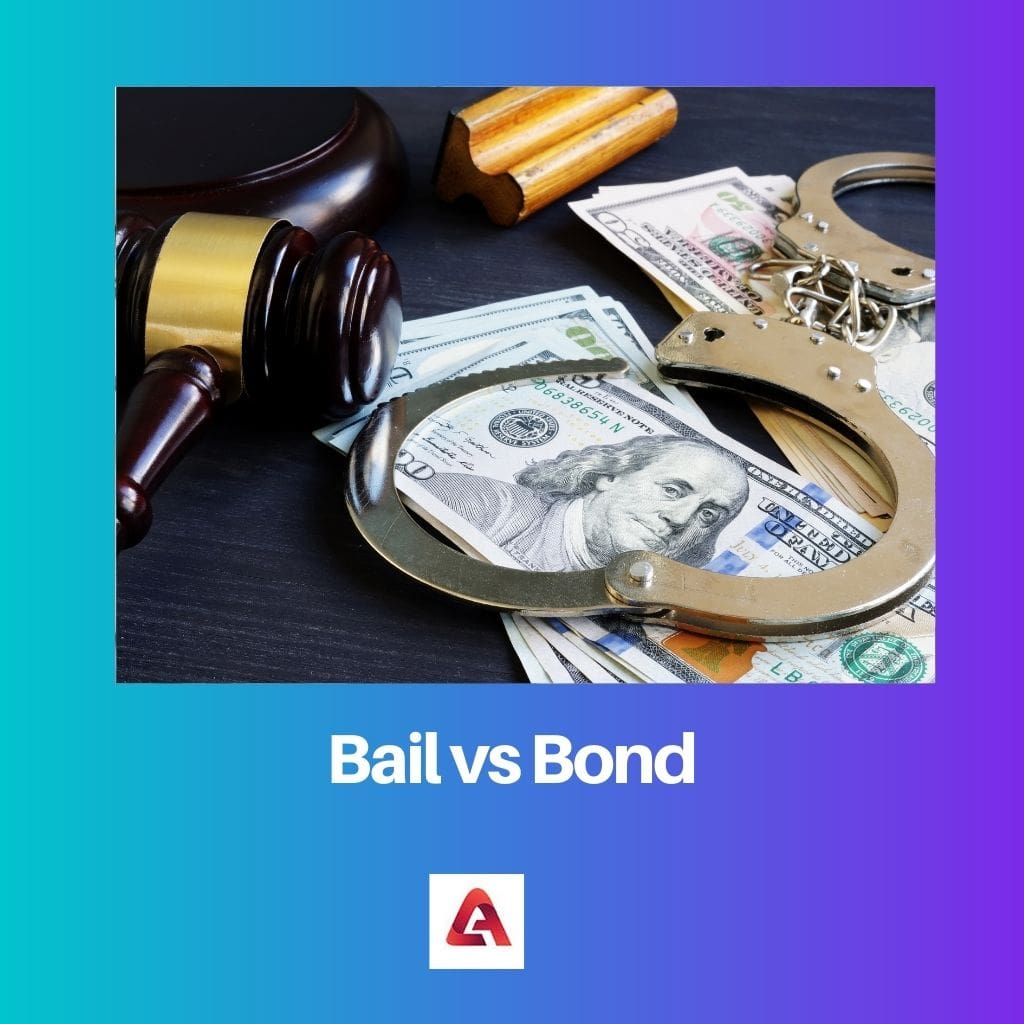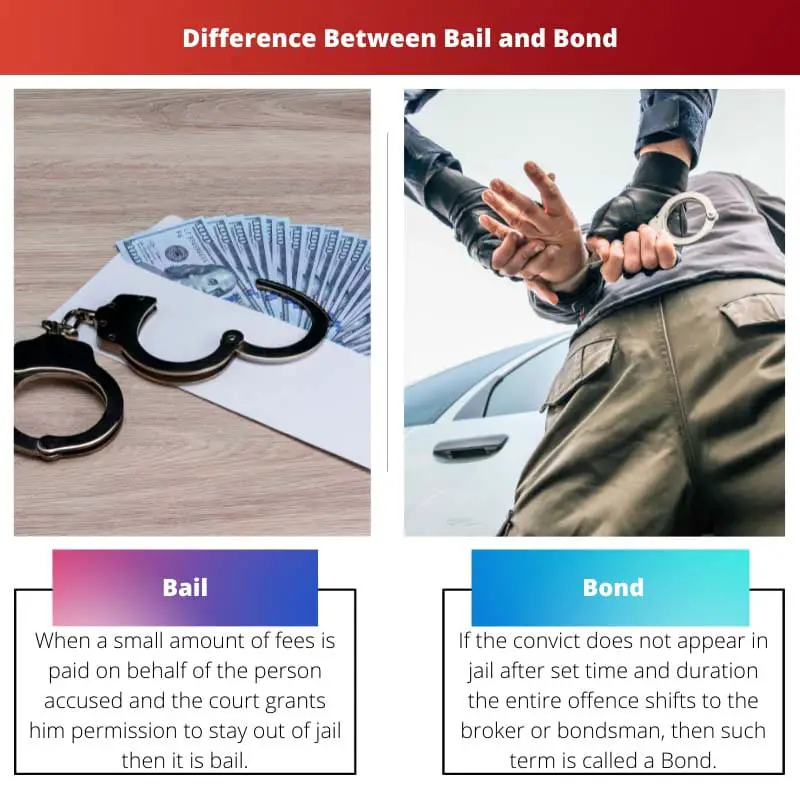Bail is the amount of money set by a court to secure the release of a defendant awaiting trial, while a bond is a financial instrument provided by a bail bond agent or a surety company to cover the bail amount if the defendant fails to appear in court. Bonds typically require a fee, usually a percentage of the total bail amount, and collateral from the defendant or their co-signer.
Key Takeaways
- Bail is the amount a defendant pays to secure their release from jail before trial.
- A bond is an insurance policy that guarantees the total amount of bail will be paid if the defendant fails to appear in court.
- Bail is paid by the defendant or a bail bondsman, while a third party pays a bond.
Bail vs Bond
The difference between Bail and bonds is that bail is the temporary release of a potential convict, whereas the bond involves a broker who facilitates the goods if in case the convict fails to appear in court. In bond, it is always an intermediator party that takes the headache and complete accountability of verdict in terms of any commitment or onuses pending.

Since you all learned the fundamental difference between Bail and Bond, now it is time for you to understand the points of difference and comparison of both terms.
Comparison Table
| Feature | Bail | Bond |
|---|---|---|
| Definition | Financial guarantee for a defendant’s appearance in court | Financial guarantee for a defendant’s appearance in court, facilitated by a bail bond company |
| Payment | Paid directly to the court by the defendant or their representative | Paid to a bail bond company, which typically charges a non-refundable fee (10-20% of the bail amount) |
| Amount | Full amount of bail set by the court | Usually a percentage (10-20%) of the bail amount set by the court |
| Parties involved | Defendant and the court | Defendant, bail bond company, and the court |
| Refundability | Refunded if the defendant appears in court and fulfills all court obligations | Not refundable, even if the defendant appears in court |
| Collateral | May require collateral if the defendant cannot afford the full bail amount | May require collateral depending on the company and defendant’s circumstances |
What is Bail?
Bail is a legal concept within the criminal justice system that allows a defendant to be temporarily released from custody while awaiting trial. It is typically in the form of a monetary payment or a pledge of property that serves as a guarantee that the defendant will appear in court for all required proceedings.
- Ensuring Appearance in Court: The primary purpose of bail is to ensure that defendants return to court for their trial and other scheduled hearings. By providing a financial incentive to return, bail helps mitigate the risk of defendants fleeing the jurisdiction or failing to appear in court, which could hinder the judicial process.
- Presumption of Innocence: Bail helps uphold the principle of “innocent until proven guilty” by allowing defendants to maintain their freedom until they are proven guilty beyond a reasonable doubt. It prevents the unnecessary pretrial detention of individuals who have not been convicted of a crime.
- Public Safety: In certain cases, bail conditions may include restrictions or requirements aimed at protecting public safety. For example, a judge may impose conditions such as electronic monitoring or travel restrictions to prevent defendants from engaging in further criminal activity while released on bail.
Determining Bail Amount
The amount of bail required for release is determined by various factors, including the severity of the alleged offense, the defendant’s criminal history, ties to the community, and flight risk. Judges have discretion in setting bail amounts, taking into account both the interests of justice and the individual circumstances of each case.
Bail amounts can range from a nominal sum for minor offenses to substantial amounts for serious crimes. In some cases, defendants may be released on their own recognizance, meaning they are not required to post bail but must promise to appear in court as scheduled.
Consequences of Bail Violations
If a defendant fails to appear in court as required or violates any bail conditions, the court may revoke bail and issue a warrant for their arrest. Additionally, the defendant or their co-signer may forfeit any bail money or collateral posted to secure their release. Bail bond agents or surety companies may also take legal action to recover losses incurred due to a defendant’s failure to comply with bail conditions.

What is Bond?
A bond is a financial instrument used in the legal system as a means to secure a defendant’s release from custody while awaiting trial. Unlike bail, which is typically paid directly to the court, a bond involves a third party, such as a bail bond agent or a surety company, who provides assurance to the court that the defendant will appear for all required court appearances.
- Financial Guarantee: Bonds provide a financial guarantee to the court that the defendant will fulfill their obligations and appear for all court proceedings. If the defendant fails to appear, the bond amount may be forfeited, imposing a financial penalty on the defendant and the bond provider.
- Access to Release: For defendants who are unable to afford bail, bonds offer an alternative means of securing release from custody. Bond agents typically charge a non-refundable fee, often a percentage of the total bond amount, in exchange for posting the bond on behalf of the defendant.
- Risk Management: Bond agents and surety companies assess the risk associated with posting a bond for a particular defendant. They may require collateral or additional assurances to mitigate the risk of financial loss if the defendant fails to comply with the terms of the bond.
Types of Bonds
- Surety Bonds: These bonds involve a surety company that guarantees to pay the full bond amount to the court if the defendant fails to appear. Surety bonds typically require collateral and a non-refundable fee paid to the surety company.
- Cash Bonds: A cash bond requires the full bond amount to be paid directly to the court. If the defendant complies with all court requirements, the cash bond is refunded at the conclusion of the case. However, if the defendant fails to appear, the cash bond is forfeited.
- Property Bonds: In some cases, defendants may offer property, such as real estate, as collateral to secure their release. If the defendant fails to appear, the court may seize the property to satisfy the bond amount.
Consequences of Bond Forfeiture
If a defendant fails to appear in court as required, the bond may be forfeited, resulting in financial loss for the defendant and the bond provider. In addition to forfeiting any fees paid to the bond agent or surety company, the defendant may also face legal consequences, including arrest and potential incarceration. Bond providers may take legal action to recover losses incurred due to a defendant’s failure to comply with the terms of the bond agreement.

Main Differences Between Bail and Bond
- Nature:
- Bail is the amount of money set by the court to secure a defendant’s release from custody.
- A bond is a financial instrument provided by a bail bond agent or a surety company to cover the bail amount on behalf of the defendant.
- Provider:
- Bail is typically paid directly to the court by the defendant or their representative.
- Bonds are provided by third-party entities such as bail bond agents or surety companies.
- Financial Responsibility:
- Bail may be refunded if the defendant complies with all court requirements, but it may be forfeited if the defendant fails to appear in court.
- Bond agents charge non-refundable fees, often a percentage of the total bond amount, in exchange for posting the bond. If the defendant fails to appear, the bond amount may be forfeited, imposing a financial loss on the defendant and the bond provider.
- Flexibility:
- Bail amounts are set by the court and can vary based on factors such as the severity of the offense and the defendant’s criminal history.
- Bond providers may assess the risk associated with posting a bond for a particular defendant and may require collateral or additional assurances to mitigate financial loss.

- https://www.degruyter.com/view/j/jbnst.2009.229.issue-1/jbnst-2009-0105/jbnst-2009-0105.xml
- https://ir.law.fsu.edu/cgi/viewcontent.cgi?article=1461&context=articles

The detailed insights into the types of bonds, particularly bail bonds, are highly valuable and elucidating. The article provides an exceptional breakdown of complex legal concepts.
Couldn’t agree more! The depth of knowledge conveyed in this piece is truly praiseworthy, serving as an invaluable resource for readers seeking to comprehend bond systems.
This article provides an excellent, in-depth comparison between bail and bonds, laying out all the fundamental differences between them. Truly enlightening!
Couldn’t agree more! The knowledge and insights gained from reading this article are highly valuable and relevant.
The clear and concise breakdown of bail and bond systems, coupled with the detailed overview of different types of bail, makes this article an exceptional resource for those looking to enhance their legal knowledge.
The well-structured presentation of complex legal concepts in this article is highly commendable, making it an indispensable read for those interested in this sphere.
Absolutely agree! The article’s insightful elucidation of these legal concepts is of immense value to readers exploring this domain.
This article provides a great deal of detail on how bail and bonds operate, including the various systems and types of bonds that exist. A highly informative piece – great work!
Absolutely! The depth of insight provided here is truly commendable, enabling readers to grasp the complexities of bail and bonds with ease.
The content is well-researched, offering a thorough understanding of the legal nuances surrounding bail and bond systems. A commendable effort!
The explanations pertaining to bail hearings and bail forfeiture are highly elucidating, enriching readers with a detailed understanding of these crucial aspects. A well-crafted article indeed!
Absolutely! It offers readers a comprehensive view of the legal intricacies related to bail proceedings and the repercussions of forfeiting bail.
The detailed comparison table is particularly helpful in distinguishing between bail and bond, making it easier for readers to grasp the key differences. A well-structured and comprehensive guide.
Absolutely agree, the article goes beyond the basics and provides readers with a thorough understanding of the topic. Kudos to the author!
Indeed, the comparison table serves as a valuable point of reference for anyone looking to comprehend the intricacies of bail and bonds.
The comprehensive explanations of bail and bond systems, along with the detailed comparison table, make this article a must-read for anyone interested in legal matters. Great job!
Indeed, the article’s thorough exploration of the legal intricacies surrounding bail and bonds is commendable and truly enriching for readers.
Absolutely! The multifaceted insights provided here offer readers a nuanced understanding of complex legal processes, making this a highly enlightening piece.
The distinction made between bail and bond is quite clear and serves as a valuable resource for anyone seeking to understand the nuances of the legal system. A comprehensive and well-structured article.
Indeed! It offers a comprehensive outline of the legal arrangements governing releases from custody, making it an essential read for those seeking to deepen their knowledge in this area.
The breakdown of the types of bail is particularly enlightening, offering readers a clear understanding of the different forms of bail arrangements. A well-articulated piece of writing.
Absolutely! The article does an excellent job of demystifying the complex legal processes and providing a comprehensive overview for readers.